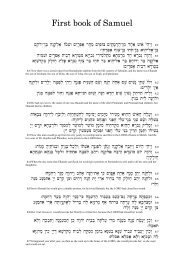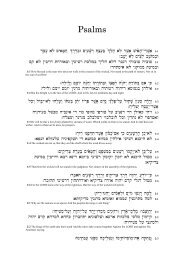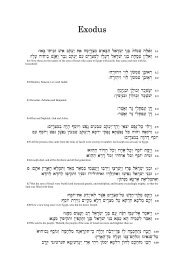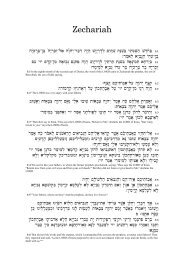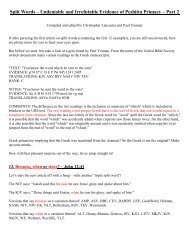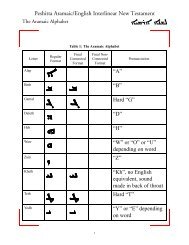ana translation
Untitled - Peshitta Aramaic/English Interlinear New Testament
Untitled - Peshitta Aramaic/English Interlinear New Testament
- No tags were found...
You also want an ePaper? Increase the reach of your titles
YUMPU automatically turns print PDFs into web optimized ePapers that Google loves.
SUPPLEMENTAL NOTES. 139<br />
to reproduce by this ij<br />
with suffix. In four of them the intention is<br />
obviously to emphasize the pronoun. In 2 Pet. i. 1 6 (T?}S<br />
CKCO/OV /xeya-<br />
Aetor^ros), and Jud. 18 (ras eavrcoi/ rt#v/uas), the choice of pronouns<br />
marks the emphasis further. So too in 2 Pet. iii. 7 (TO) O.VTOV Aoyu)) the<br />
emphasis is<br />
reverential, and seems to point to the (somewhat remote)<br />
subject (see ver. 5, TOV @ou). Again, in Jud. 20, the writer's appeal<br />
to his readers for personal effort, on the basis of their existing faith, is<br />
pointed by the prominent position given to the pronoun (rrj<br />
In all these cases the OlXi), tOOla), .QH-^jj of Philox. reproduces<br />
the emphatic force of the Greek. In the two remaining, the like force<br />
takes different forms. In 2 Pet. ii. 2 (avriav rrj ao-eXyeta) the transposition<br />
of the pronoun points to the "false teachers" whose "lascivious<br />
way " many will follow, and the Syriac<br />
. Od\*> (Zo211^ marks this ;<br />
whereas .OQlZaai^ would rather convey " will follow their own lascivious<br />
way." In Jud. 3 (^/xoiv the<br />
orcorjyptas) order of the words indicates<br />
that (as the epithet KOII/^S requires) by<br />
" our salvation<br />
" the writer does<br />
not mean " salvation for himself and those about him," but " salvation<br />
which is mine and yours," yours as well as mine : in Syriac, ^-^-? H-M ,<br />
not *<br />
merely.<br />
Similarly, in the remaining instances, in which the Greek though it<br />
implies emphasis does not mark it by choice or order of words, the<br />
Syriac translator at his own discretion indicates it by ^*J<br />
Thus, in 2 Pet iii. 13 Ol^jij is emphatic<br />
with suffix.<br />
for the same reason as in<br />
iii. 7, though in /caret TO eTrayyeX/xa CLVTOV the pronoun is not placed<br />
before the noun as in TO) avrov Aoyu>. Thus, too,' by . iNi? (2 Pet. i. 1 5 ;<br />
3 Joh. 4) there is laid a personal stress on " my departure," "my<br />
children " (TYJV e/xryv ZoSov, TO. e/xa re'/cca), just as in the instance above<br />
cited from the Peshitta (Joh. vii. 8).<br />
17/xtov), in which place the ^'? emphasizes<br />
So again in 3 Joh. 12 (fj<br />
the reference to<br />
Tvpovptv, just before. In 2 Joh. 12 (rj x a P a ^/*wi/) the force of T~^-? is<br />
to mark that the joy, as in Jud. 3 (see above) the faith, is "ours" in<br />
the sense of "mine and yours." With this is to be reckoned the ^-^-?<br />
of Jud. 21 (where Philox. reads f]/*wv in the Greek, unsupported), for<br />
this verse merely repeats the T-^-? \**** of Jud. 3 ; WT} and o-oor/y/oi'a<br />
being in Syriac alike expressed by }** Yet again, in 2 Pet. ii. 12<br />
(eV TTJ 0opa O.VTW), tOOl^ij has the same distinctive emphasis as in<br />
ii. 3, the translator (wrongly perhaps) taking avruv to relate to the<br />
(persons or) things indicated by the plur. relative pronoun in the words



